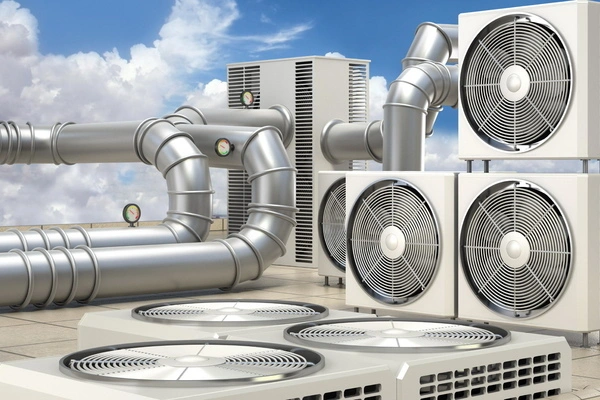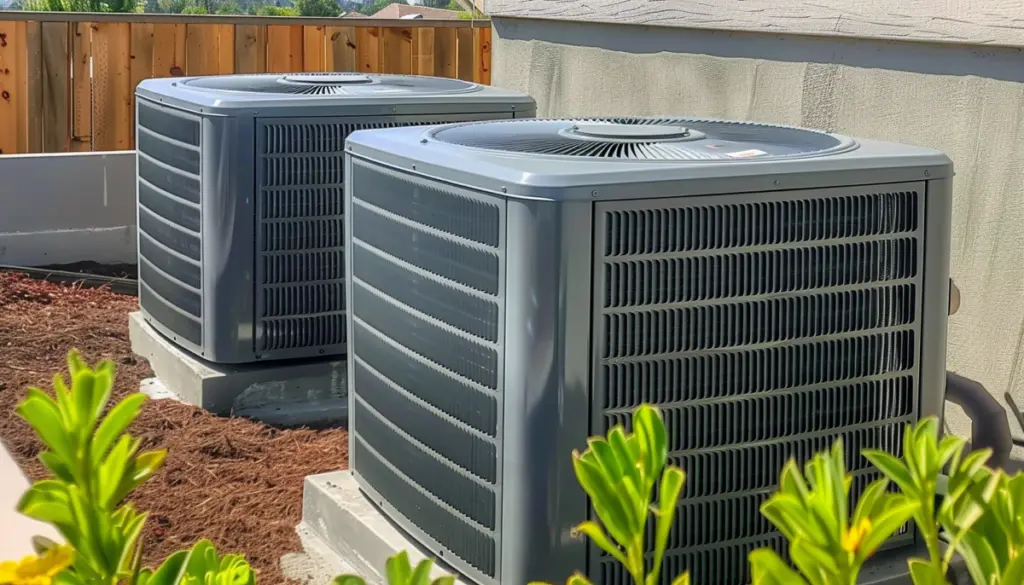Find out how HVAC experts maximize performance of your climate system
Checking Out the Vital Parts of a Reliable A/c System
A reliable heating and cooling system is improved numerous important components that function in consistency. Each part, from the thermostat to the ductwork, plays a crucial role in keeping convenience and power performance. Understanding these aspects is essential for enhancing efficiency and improving interior air quality. As one checks out these components, the intricate relationships in between them expose understandings into improving overall system performance. What specific variables add most to this efficiency?
The Duty of the Thermostat in HVAC Performance
Although frequently overlooked, the thermostat plays an important duty in the efficiency of heating and cooling systems. HVAC experts. This little device works as the primary nerve center, controling temperature level settings and making certain ideal convenience within a space. By accurately sensing the ambient temperature, the thermostat communicates with the air, heating, and ventilation conditioning units to keep the preferred environment
An efficient thermostat lessens energy consumption by turning on the heating and cooling system just when needed, thus preventing excessive home heating or cooling. Modern programmable and smart thermostats enhance this performance even more by enabling individuals to establish schedules and remotely adjust setups, adapting to daily regimens.
In addition, the placement of the thermostat is essential; inappropriate area can result in imprecise temperature level readings, resulting in inefficient procedure. On the whole, a well-functioning thermostat not only boosts convenience however additionally contributes significantly to power financial savings and the longevity of the HVAC system.
Understanding the Significance of Air Filters
Air filters serve an important function in cooling and heating systems by guaranteeing that the air distributing within a room continues to be clean and healthy and balanced. These filters trap dirt, allergens, and other toxins, stopping them from being recirculated throughout the environment. By capturing these bits, air filters add to improved interior air top quality, which can greatly benefit passengers' health and wellness, particularly those with allergic reactions or respiratory system problems.
In addition, maintaining clean air filters boosts the performance of HVAC systems. Clogged filters can restrict airflow, causing the system to work more difficult to preserve desired temperatures, bring about enhanced energy usage and greater energy bills. Consistently replacing or cleansing filters is a vital upkeep action that can lengthen the life expectancy of a/c tools. Inevitably, understanding the significance of air filters enables property owners and structure managers to take positive procedures to guarantee a well-functioning, efficient a/c system that advertises a comfortable and secure indoor atmosphere.

The Performance of the Heater and Warmth Pump
Heating systems and heatpump are critical parts of a/c systems, in charge of offering warmth during chillier months. Heating systems operate by home heating air via burning or electric resistance, then dispersing it throughout the home using ducts. They typically use fast heating and can be fueled by natural gas, electricity, or oil, relying on the system kind.
Conversely, warm pumps move warmth instead of generate it. They extract warmth from the outside air or ground, also in reduced temperature levels, and transfer it indoors. HVAC experts. This dual capability allows heatpump to additionally supply air conditioning in warmer months, making them flexible choices for year-round environment control
Both systems require proper upkeep to guarantee efficiency and longevity. While furnaces master severe cool, warm pumps can be helpful in modest environments. Recognizing their unique functionalities aids house owners in choosing one of the most ideal option for their heating requires.
Checking Out the A/c System
The air conditioning system is a vital part of heating and cooling systems, available in numerous types to suit various needs. Comprehending the performance ratings of these devices is essential for making educated choices about power usage and expense. This area will certainly discover the diverse kinds of ac unit and clear up exactly how efficiency ratings impact efficiency.
Kinds Of Air Conditioners
While various aspects influence the selection of a/c systems, comprehending the various types readily available is critical for house owners and building managers alike. Central air conditioning conditioners are developed to cool down entire homes or buildings, using a network of air ducts for air movement. Home window devices use a more local remedy, suitable for small rooms or single rooms. Mobile a/c give adaptability, allowing customers to move the system as needed. Ductless mini-split systems are one more option, incorporating the effectiveness of main systems with the benefit of zoning, as they need no ductwork. Finally, geothermal systems harness the earth's temperature level for energy-efficient air conditioning. Each kind features click reference unique advantages, making educated choices essential for effective environment control.

Efficiency Rankings Clarified
Comprehending efficiency scores is important for selecting the ideal a/c unit, as these metrics provide understanding right into the system's performance and power usage. One of the most usual ranking for air conditioning system is the Seasonal Energy Efficiency Ratio (SEER), which determines the cooling output during a common air conditioning season split by the complete electric power input. A higher SEER shows much better performance. Furthermore, the Power Efficiency Proportion (EER) is made use of for gauging performance under particular problems. An additional crucial metric is the Energy Star certification, which represents that a device fulfills rigorous power performance standards. By reviewing these rankings, consumers can make informed options that not only maximize comfort yet also minimize energy prices and ecological effect.
The Importance of Ductwork and Airflow
Efficient ductwork layout and air movement monitoring play crucial duties in the total effectiveness and performance of heating and cooling systems. Appropriate ductwork warranties that conditioned air is distributed uniformly throughout a space, decreasing temperature level variations and improving convenience. Properly designed ducts minimize resistance to airflow, minimizing the work on HVAC equipment and inevitably reducing energy consumption.
Air movement administration involves strategically putting vents and signs up to enhance the circulation of air. This protects against usual issues such as hot or chilly areas, which can happen when air movement is obstructed or inadequately balanced. Additionally, the right air duct products and insulation can additionally enhance efficiency by lowering heat loss or gain during air transportation.
An effective ductwork system not just adds to power savings but can additionally extend the life-span of cooling and heating devices by reducing unneeded strain (HVAC experts). As a result, understanding the relevance of ductwork and airflow is important for accomplishing peak cooling and heating system efficiency
Regular Maintenance Practices to Boost Performance
Routine maintenance practices are essential for making certain peak efficiency of heating and cooling systems. These methods include routine evaluations, cleaning, and essential repair work to maintain the system running efficiently. On a regular basis altering air filters is see page vital, as blocked filters can obstruct airflow and minimize efficiency. Furthermore, professionals must check and tidy evaporator and condenser coils to avoid getting too hot and power waste.
Annual specialist examinations are additionally advised, as skilled specialists can determine potential issues before they escalate. Lubricating moving parts lessens damage, adding to a much longer life expectancy for the system. In addition, making certain that the thermostat operates appropriately aids in maintaining perfect temperature control.

Regularly Asked Inquiries
Just how Usually Should I Change My Thermostat?
Thermostats need to typically be changed every 5 to one decade, relying on use and modern technology innovations. Normal checks are a good idea to ensure peak performance, especially if experiencing inconsistent temperature level control or raised power expenses.
What Size Air Filter Is Best for My HVAC System?
The best dimension air filter for a cooling and heating system differs by unit design. Typically, it's vital to consult the proprietor's handbook or check the existing filter measurements to assure peak performance and air quality.
Can I Mount a Heatpump Myself?
Installing a heatpump individually is possible for skilled people, however it needs expertise of you could try here electric systems and local codes. Employing a professional is advised to ensure proper setup and ideal system efficiency.
Exactly how Do I Know if My Ductwork Is Efficient?
To figure out ductwork efficiency, one need to examine for leaks, action airflow at vents, evaluate insulation quality, and review temperature distinctions between supply and return air ducts. Professional evaluations can provide complete insights into total performance.
What Are Indications My HVAC Requirements Immediate Upkeep?
Signs that a cooling and heating system needs instant upkeep include unusual sounds, irregular temperatures, enhanced power bills, unpleasant odors, and constant biking. Dealing with these problems promptly can avoid additional damages and guarantee top system efficiency.
Air filters offer an essential function in A/c systems by assuring that the air flowing within a space remains healthy and balanced and tidy. In addition, maintaining clean air filters enhances the effectiveness of A/c systems. Ductless mini-split systems are an additional alternative, combining the effectiveness of central systems with the ease of zoning, as they call for no ductwork. Understanding efficiency ratings is important for choosing the ideal air conditioning system, as these metrics give insight into the system's efficiency and power intake. The ideal dimension air filter for a HVAC system varies by unit layout.